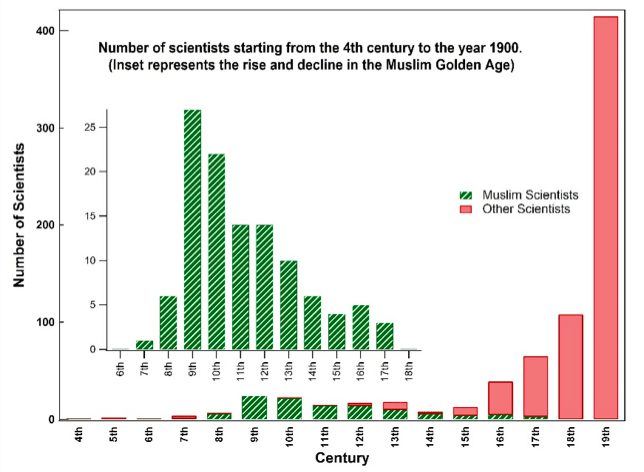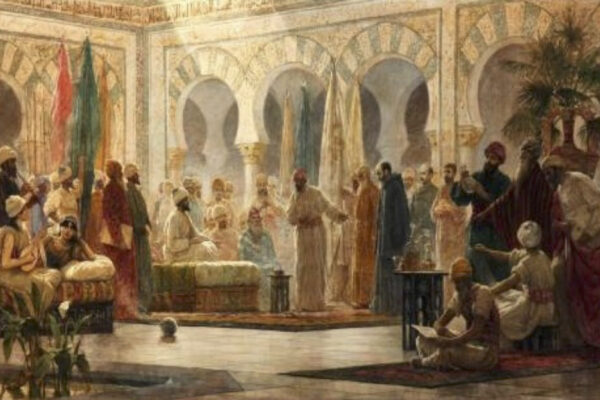Muslims, then and now, view the achievements of their civilisation as a proof of superiority, righteousness and Devine Providence.
Muslims, then and now, view the achievements of their civilisation as a proof of superiority, righteousness and Devine Providence.
As the military assault on ISIS continues, no one doubts that ISIS will be militarily defeated in Iraq and Syria. Yet, no one expects this defeat to be the death nail to their ideology and mass appeal, nor will it guarantee that they will not be able to reemerge in another troubled region. That is because terrorism is the outcome of failed societies, trauma, and misguided effort driven by false narratives to reclaim old glory.
Starting in the 7th century, and within a 100-year period, an obscure religious group expanded territorially, at the expense of old established empires, to fill half of the known world and create a world civilisation. The rise and spread of Islam spurred a remarkable scientific and intellectual revolution. This period became known as the Golden Age of Islam, where Muslim scientists excelled and made significant advances in mathematics, medicine, astronomy, optics, and chemistry.
Muslims, then and now, view the achievements of their civilisation as a proof of superiority, righteousness and Devine Providence. In contrast to this rosy past and since the fall of the caliphate a hundred years ago, the population of the Muslim world endured much suffering through European colonialism, Cold War proxy conflicts, and lately, terrorism. As a result of this dichotomy, a simplistic narrative of victimhood and guilt took hold among Muslims. This narrative boils down to God’s displeasure for abandoning their religion in addition to being the victims of conspiracies aimed at keeping them down. This narrative began to take roots in the early seventies and since then, the condition of the region has been getting dire.
According to this narrative, most Muslims are under the impression that their Golden Age lasted as long as the Caliphate did. Rather, upon closer examination, the Golden Age appears to have been relatively short-lived, and the Muslims lost their scientific enlightened culture long before they started to lose their military dominance. In order to quantify that trend, I plot the number of known accomplished scientists, in the fields of physical and life sciences, for each century. The primary resource for this research is Isaac Asimov’s Biographical Encyclopedia of Science & Technology. The resulting chart below traces the progress of science from the fourth century to the year 1900.

The chart puts the Golden Age in its proper historical perspective. It clearly shows its amazing rise and disappointing early decline that started even before the European renaissance and reformation movements.
Given the high level of pride Muslims have for the Golden Age, it is surprising how little examination or even awareness Muslims give to this early decline. This decline coincided with fundamental changes in religious doctrines reflected in the decline of a rationalist school of thought (the Muatazilites) and the rise of a traditionalist one (the Ashaarites) whose influence continues to dominate till this day. A fact that eludes most Muslims today is that the majority of the star scientists and thinkers of the Golden Age were followers of the rationalist school of thought. The two schools of thoughts differed on many issues, and among them were pre-determinism, free will, and the degree of figurative vs literal interpretation of religious texts. The traditionalists advocated the belief in an extremely personal and active God who has predetermined the fate of everything, while continuously changing the course of events based on the supplication of believers. The rationalists, on the other hand, believed in an omnipotent though less active God, that created the world through specific laws which humans can, in principle, investigate and access.
The traditionalists further undermined the progress of science by downplaying the fundamental relationship between cause and effect. They stressed that it is God who is the only cause of everything whereas “cause and effect” are merely a related sequence of events that God can choose to suspend as He wishes. The peril in this line of thinking is evident in recent discovery by brain scientists, who found separate and competing brain networks for analytical vs. spiritual thinking. These networks can be observed to be either active or suppressed when engaged according to the relevant context. But for a religious believer, the invocation of God activates the spiritual brain network and suppresses the analytical network. Therefore, the belief in a personal, active and always intervening God implies more frequent suppression of one’s analytical networks.
One possible contributing factor that facilitated the transformation from the rationalist to the traditionalist school of thought, is the late canonization of the Hadith tradition – the sayings and deeds of the prophet Mohammed. This effort chronologically coincides with the beginning of the decline of the Golden Age during the late 9th-10th century. These canonised hadith collections supported the views of the traditionalist school of thought and included many superstitious and scientifically dubious claims. Consistent with the traditionalist views, old texts from the middle ages clearly show that it is frowned upon to attribute physical phenomena, such as rain or Solar eclipses, to natural causes. Rather these phenomena should only be attributed to God’s power, and failing to do so contradicts and diminish a person’s degree of belief.
Physicist Richard Feynman once said, “I think it’s much more interesting to live not knowing than to have answers which might be wrong”. Unfortunately, people of all religions and cultures sought to banish uncertainties and doubts by amending religious texts with views that turned out to be wrong. As a result, it is reasonable to expect that the belief in certain scientifically dubious Hadith traditions such as; the Sun disappearing under God’s throne after sunset, extreme heat on earth is caused by God opening a window onto hellfire, or that God seeks to scare people through cosmic events such as Solar eclipses, prevented early Muslims from achieving a correct understanding of celestial mechanics or the laws of thermodynamics.
Unfortunately, the views of the traditionalist school of thought are still deeply rooted among the majority of today’s Muslims. In many corners of the Muslim world, support and interest in science hinge solely on its potential to show the greatness and glory of God while ensuring that it does not contradict religiously held views or interpretation. For Muslims to reclaim old glory and become great again, there is no alternative to rethinking their dominant narratives and figuring out how their ancestors lost an enlightened culture and lost a scientific race, in which they had a ~600-year head start.
By Ahmed Lobad. Ahmed is a physicist living in Massachusetts.





